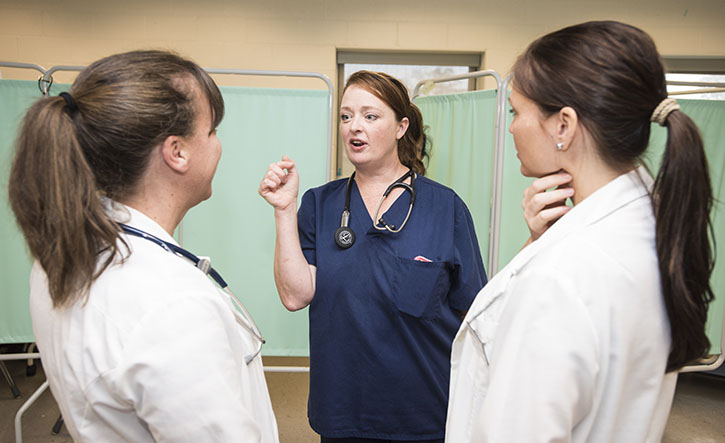
Rebecca Sutter, associate professor and clinical director in the School of Nursing, will oversee a $2.7 million grant from the U.S. Health Resources and Services Administration to expand Mason's undergraduate nursing program. Photo by Ron Aira.
The U.S. Health Resources and Services Administration has awarded George Mason University’s School of Nursing a grant of more than $2.7 million over four years to expand the undergraduate nursing program (BSN).
The grant will help prepare the next generation of health care professionals and is part of the federal government’s Nurse Education, Practice, Quality and Retention funding program. More specifically, the award will be used to expand the skills of nursing students in health maintenance, interprofessional team models of care, mental health care, substance use and chronic diseases.
“This grant is exceedingly timely, as the college is developing novel public health academic programs and research opportunities for our students,” said Germaine Louis, dean of the College of Health and Human Services. “With this grant, Mason nursing students will be among the first to have public health introduced early in their academic programs, positioning them for even greater career options.”
The grant runs from July 2018 through late June 2022.
Rebecca Sutter, an associate professor and clinic director at the School of Nursing, will oversee the grant and lead the effort to expand the program.
Sutter requested the money to help provide stronger primary health care to underserved populations, which are defined by the federal government as having too few primary care providers, high infant mortality, high poverty or a high elderly population.
Traditionally, nursing programs emphasize short-term care—such as treatment after surgery or for a chronic illness—rather than primary, day-to-day and preventative care.
The federal grant will include stipends to allow students to increase their experience in community settings outside the classroom, Sutter said, adding that she expects to update the program to focus on public health concepts in primary, community and ambulatory care.
“Building on the existing Mason and Partners Clinics academic-practice model, training will be integrated into Mason’s (BSN) course work, and students in clinical courses will provide direct care to vulnerable and underserved populations in our local community,” said Sutter.
The Mason and Partners Clinics are interprofessional clinics that serve the uninsured and the immigrant and refugee communities in Northern Virginia, and will be a model for the program’s new curriculum. While traditional nursing programs may not properly prepare nursing students for complex medical and social needs found in underserved populations, Sutter said, the Mason and Partners Clinics provide firsthand experience in understanding how to care for those needs.
“By exposing (BSN) students to these concepts in their education, we will produce graduates who are relevant and who have an expanded skill set focused on wellness and population care, with a renewed focus on patient-centered care, care coordination, data analytics and quality improvement,” Sutter said.
